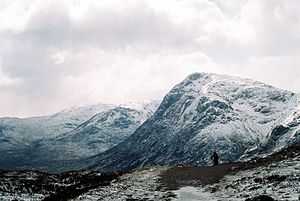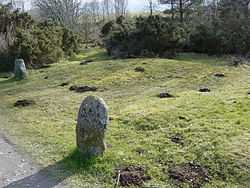John Prebble
John Edward Curtis Prebble, FRSL, OBE (23 June 1915 – 30 January 2001) was an English journalist, novelist, documentarian and popular historian. He is best known for his studies of Scottish history.
Early life
He was born in Edmonton, Middlesex, England, but in 1921 he emigrated with his parents to Saskatchewan, Canada, where his father had a brother. Returning to Edmonton with his family when aged 12, he attended the Latymer School. He joined the Communist Party of Great Britain but abandoned it after World War II.
The High Girders

He became a journalist in 1934 and served during World War II with the Royal Artillery. His wartime experiences led to his novels, Where the Sea Breaks (1944), and The Edge of Darkness, published in 1947. His Canadian prairie experience influenced two of his works, The Buffalo Soldier an historical novel about the American West, and Culloden, about the 1746 battle which resulted in the defeat of the Jacobite uprising. The story of Battle of Culloden had been part of the family lore when he grew up in the predominantly Scottish township of Sutherland, in rural Saskatchewan. His interest in the American West was also inspired by the fact that part of his family lineage was Native Canadian: his 1958 book, My Great-Aunt, Appearing Day, and other stories tells of a Native American relative; this story appeared as the film White Feather in 1955.
One of his first big successes was The High Girders (1956), a description of the Tay Bridge Disaster, involving the collapse of the first Tay rail bridge to Dundee. It has remained a popular work ever since publication. It was the first detailed account of the disaster to expose the many problems encountered during construction of the bridge, and Prebble also made extensive use of the Board of Trade Public Inquiry in reviewing the evidence. He included some of the many photographs made at the time, and which show the extent of devastation of the centre part of the bridge on the night of 28 December 1879. There is still controversy over the detailed causes of the failure, especially the contributions from poor design of the columns using cast iron and the storm raging at the time of the fall. However, the original conclusions of the Inquiry still stand. It found that the bridge fell owing to "bad design, bad construction and bad maintenance".
Fire and Sword Trilogy


The Fire and Sword Trilogy is about the fall of the Scottish clan system. Culloden was the first book and it chronicles the defeat of the clans in one pivotal battle. The two other works were The Highland Clearances (1963) and Glencoe (1966). Glencoe was a study of the causes and effects of the Glencoe massacre in 1692, when British soldiers and members of the Campbell Clan attacked and killed members of Clan Donald who lived in Glencoe, a remote glen in the west highlands of Scotland. The book focuses on the political machinations to bring the unruly MacDonalds to heel, both by King William and by Scots with ambitions in royal circles. The massacre was notorious, both then and now, for the Campbells had abused the hospitality of the MacDonalds who had given them food and lodgings for several days before.
His later works, Mutiny (1975) and The King's Jaunt (1988) would extend the theme. The Highland Clearances remains one of his best known works perhaps because the subject of the Highland clearances as a discrete historical event remains a subject of debate. The clearances caused the depopulation of large areas of the highlands, and force was often used to remove the crofters from their houses and lands.

Prebble makes a case that there was a conscious effort to remove Highlanders and Islanders from Scotland. Others argue that it was purely economic and social factors which led to the population decline in rural Scotland. The Historiographer Royal in Scotland Gordon Donaldson was particularly cutting in his criticism and declared Prebble's books to be "utter rubbish", a comment which some would say reflects on him rather than Prebble.[1] Independent opinion supports Prebble's interpretation of events, which were not unlike the similar clearances in Ireland during the potato famines. Both reflected the autocratic and feudal nature of land tenure in those countries. Most of the clearances took place on vast estates held by absentee landlords who decided to improve their income by replacing their tenants by sheep.
Other media
He wrote the article entitled "Slaughter in the Sun" for the magazine Lilliput in 1958, on which the film Zulu (1964) was based, and co-wrote the screenplay with the director, Cy Endfield. He also wrote radio dramas and documentaries for the BBC. They were usually, but not always, based on his published works. For example, in 1977, he wrote an adaptation of John Buchan's The Three Hostages.[2]
Personal
He was married to the artist Betty (Golby) Prebble. He had a daughter, Sarah Prebble, and two sons, Jolyon and actor and narrator Simon Prebble. His first wife died in 1993 and he married his long-term mistress[3] Jan Reid in 1994.
Publications include
Fiction
- Where the Sea Breaks, Secker & Warburg, 1944
- Edge of Darkness, Secker and Warburg, 1947
- Age without Pity, Secker & Warburg, 1950
- The Brute Streets, Secker & Warburg, 1954
- The Mather Story, Secker & Warburg, 1954
- My Great-Aunt, Appearing Day, And Other Stories, Secker and Warburg, 1958
- The Buffalo Soldier, New York Harcourt, Brace & Company, 1959
- Spanish Stirrup, and other stories, Holt, Rinehart and Winston, 1973
History
- Disaster at Dundee, Harcourt, Brace & Co., 1956 (also published as High Girders: The Tay Bridge Disaster, 1879, Secker and Warburg, 1975)
- Culloden, Atheneum, 1962
- The Highland Clearances, Secker & Warburg, 1963
- Glencoe: The Story of the Massacre, Secker & Warburg, 1966
- The Lion in the North: A Personal View of Scotland's History, Penguin Books, 1973, ISBN 0-14-003652-0
- Darien: The Scottish Dream of Empire (also published as Darien: A Scots Colony in the New World, 1698-1700), 1968
- Mutiny: Highland Regiments in Revolt, 1743-1804, 1975, ISBN 0-14-004328-4
- The Borgias (with Sarah Bradford), 1981
- The King's Jaunt: George IV in Scotland, August, 1822,, Birlinn Limited, Edinburgh, 2000, ISBN 1-84158-068-6 (originally published in 1988)
Other books
- Elephants and Ivory: True Tales of Hunting and Adventure, John Alfred Jordan (as told to John Prebble); also published as Mongaso Man Who Is Always Moving: The Story of an African Hunter John Alfred Jordan (1956)
- John Prebble's Scotland, Secker & Warburg, 1984, ISBN 0-436-38634-8
- Landscapes and Memories, An Intermittent Autobiography, Harper Collins, London, 1993 ISBN 0-00-215184-7
Films
- Culloden, BBC documentary, 1964 written by Prebble and directed by Peter Watkins.[4]
- Zulu, screenplay
Honours and awards
References
| Wikiquote has quotations related to: John Prebble |
- ↑ "The Independent Obituary". Retrieved 14 June 2006.
- ↑ "Richard Hannay in The Thirty Nine Steps by John Buchan on BBC Radio & in other media". Archived from the original on 26 February 2006. Retrieved 14 June 2006.
- ↑ "John Prebble’s ‘other woman’ lifts lid on affair" The Scotsman 3 January 2014
- ↑ "Peter Watkins films - Culloden". Retrieved 14 June 2006.
|